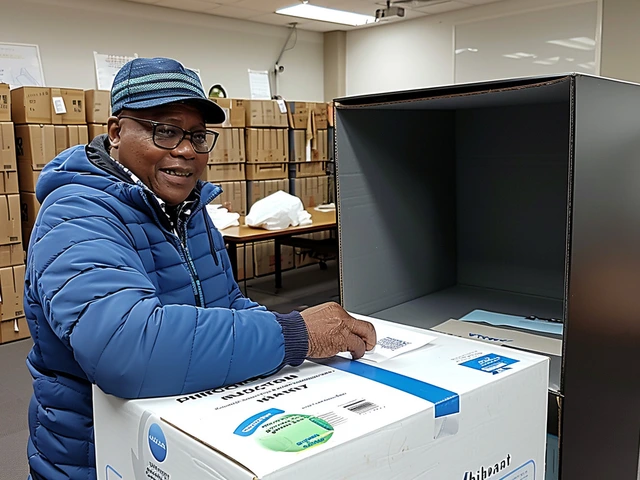Introduction: A Call for Technological Integration
In a world that is constantly evolving, the adoption of technology in various sectors has become more of a necessity than a luxury. This sentiment rings especially true for the South African Police Service (Saps), as highlighted by South Africa's Minister of Water and Sanitation, Senzo Mchunu. In a recent statement, Mchunu underscored the importance of integrating modern technology into the operations of Saps to enhance both their efficiency and effectiveness. This comes at a time when the country faces numerous security challenges that necessitate a robust and well-equipped police service.
Modernizing Law Enforcement
The Current State of Saps
The South African Police Service is the national police force of South Africa tasked with maintaining law and order, preventing crime, and ensuring public safety. However, like many other law enforcement agencies worldwide, Saps faces significant challenges in performing its duties. These challenges include limited resources, high crime rates, and an urgent need for modernization. As traditional methods of policing struggle to keep up with the complexities of contemporary crime, there is a growing recognition that technology must play a pivotal role in transforming law enforcement practices.
The Impact of Technology on Policing
Modern technology offers a range of tools and solutions that can significantly enhance the capabilities of police forces. These include advanced surveillance systems, data analytics, mobile communication devices, body-worn cameras, drones, and automated crime reporting systems. Such technologies enable more efficient crime detection, evidence gathering, and resource allocation. Moreover, they empower police officers to perform their duties more effectively while ensuring greater accountability and transparency. Mchunu's advocacy for technological integration reflects an understanding of these benefits and a commitment to advancing the capabilities of Saps in this digital age.

Key Areas of Technological Integration
Surveillance and Monitoring
One of the most critical areas where technology can make a significant impact is in surveillance and monitoring. High-definition cameras, facial recognition software, and real-time data processing can help Saps monitor high-crime areas, identify suspects, and respond to incidents swiftly. These technologies also provide valuable evidence that can be used in court, increasing the likelihood of successful prosecutions. By leveraging such tools, Saps can enhance its ability to prevent and investigate crimes more effectively.
Data Analytics
Data analytics is another crucial component of modern policing. Utilizing big data and artificial intelligence, police forces can analyze vast amounts of information to identify crime patterns, predict potential hotspots, and allocate resources more efficiently. This proactive approach to policing enables law enforcement agencies to stay ahead of criminals, rather than merely reacting to incidents after they occur. Mchunu’s emphasis on technology integration suggests that Saps should invest in analytical tools that can provide actionable insights and inform strategic decision-making.
Communication and Coordination
Effective communication and coordination are essential for any police service. Modern technology offers numerous solutions to enhance these aspects of policing. Mobile communication devices and digital platforms enable officers to stay connected, share information in real-time, and coordinate efforts seamlessly. This is especially important during large-scale operations or emergencies, where timely and accurate information can be the difference between success and failure. Mchunu's call for technological adoption includes recognizing the importance of improving communication channels within Saps.
Challenges to Technological Adoption
Funding and Resources
While the benefits of technology integration are clear, there are also significant challenges that must be addressed. One of the primary obstacles is the funding required to acquire and implement advanced technological solutions. Saps, like many other government agencies, operates on a limited budget, and securing the necessary resources can be challenging. However, investing in technology should be seen as a long-term strategy that will ultimately lead to cost savings through improved efficiency and reduced crime rates.
Training and Adaptation
Another challenge is the need for training and adaptation. Introducing new technologies requires officers to learn how to use them effectively, which involves comprehensive training programs. Resistance to change can also be an issue, as some officers may be reluctant to adopt new methods and rely on traditional practices. To overcome these challenges, Saps must prioritize training and create a culture that embraces innovation and continuous improvement.
Privacy and Ethical Considerations
Privacy and ethical considerations are also important factors in the adoption of technology in policing. The use of surveillance systems and data analytics raises concerns about the potential for misuse and the violation of individuals' privacy rights. It is essential for Saps to establish clear guidelines and oversight mechanisms to ensure that technology is used responsibly and ethically. This includes maintaining transparency with the public and safeguarding citizens' rights while enhancing public safety.

The Future of Policing in South Africa
As South Africa continues to grapple with complex security challenges, the integration of technology into policing will be crucial for the future success of Saps. Mchunu's call to action highlights the need for a strategic approach to modernization, one that embraces innovation while addressing the practical and ethical concerns associated with technological adoption. By leveraging the power of technology, Saps can enhance its capabilities, improve its operational efficiency, and better serve the communities it is sworn to protect.
The road ahead will undoubtedly involve overcoming various challenges, but the potential rewards make it a worthwhile endeavor. The commitment to adopting and integrating technology reflects a forward-thinking approach that recognizes the evolving nature of crime and the need for dynamic solutions. With the right investments, training, and ethical considerations in place, Saps can set an example for other law enforcement agencies, both within Africa and globally.





Leave a Comments